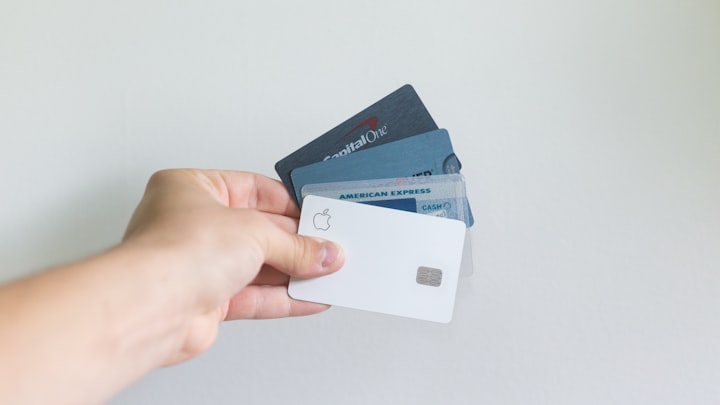Have fun with your credit cards by earning money with them
Will require some discipline to use cards responsibly

"Why does financial planning always have to be painful and doom and gloom?" - young person I was recently speaking with
"I love it when a plan comes together." - Hannibal Smith in the A-Team
Managing one's finances is usually a very dry and serious subject with lots of overtones of sacrifice and self-denial. This makes it a chore to think about and focus on. Today, let's switch things around and make things fun - I'd like to talk about how you can turn credit cards upside down to earn you rewards and/or money instead of your paying them interest. Spoiler alert: It will take some discipline, but the points and cash you earn can be a fun way to be rewarded for that discipline.
Credit card rewards: what are they?
There are lots and lots of different credit cards out in the market. These cards and their issuers all compete with each other to earn a space in your wallet. One big way that they differentiate between themselves and incent you to choose their card over the others is to offer rewards for your purchases.
Rewards come in all shapes and sizes, but are earned based on what you spend. As such, they are a form of rebates on the expenditures you make with that card - as you spend more, you earn more. Rewards are made in the form of either points that you exchange for various goods and services or cash. While there are many ways these rewards are tallied, here are the key types:
- Flat rewards: For every dollar spent, you get a fixed amount of points (or cash)
- Rewards by category: Reward levels differ by the category of spend. For example, you might get points or cash valued at 4% of your spend on gasoline, 3% of travel and 1% of everything else
- Graduated rewards: Rewards start at a fixed level, say 0.5% for the first $200 spent in a month, then grow to 1% of the value for the next $300 of spend and 2% for the next $500
How do I find the card(s) with the best rewards for me?
Naturally, this depends on what matters the most to you. Just like there are an infinite number of credit cards out in the market, there are an infinite number of variations of rewards. To maximize your rewards aligned with your unique wants, I would recommend that you get credit cards with the following characteristics:
- One or two "rewards by category" cards with their highest payouts in areas that matter a lot to you: Each rewards card puts different payout levels on different categories. If you really love travel, there are cards whose highest payouts are for airline tickets or hotel stays. If a big part of your budget is spent on groceries, there are cards whose highest payouts are on supermarkets. Figure out which category or categories are the most important to you and get cards that pay out the most on those categories. Use these cards only when you make a purchase in that category to maximize your payout. One caution: get a maximum of two of these cards to minimize complexity and the impact on your credit score
- A flat reward card for all other purchases: Get the flat reward card with highest payout you can find. While the payout will be lower than what you get in the specific categories in your other cards, it will be higher than what you get for non-prioritized categories with those cards. Use this card for all your purchases outside the categories prioritized in your other cards
To find the right cards for which to apply, there are plenty of online comparison sites which give you details on different credit card offers and help compare them. I find Nerdwallet to be a reputable site so here's a comparison article on their site titled 11 Excellent Credit Cards of 2023.
Why do credit card issuers offer rewards?
Like any other business, credit-card issuers are looking for ways to maximize their profit. They know that getting people to sign up for one of their cards is very competitive so they offer rewards to close the deal. That's the first step in their being able to earn money from you. Once you have their credit card, they earn money through the following:
- Fees: Credit cards charge fees such as annual fees, late payment fees or cash-advance fees. In total in 2020, US consumers paid a total of $20.8B (yes, $B as in Billions of dollars) of these fees (The Consumer Credit Card Market). The sad thing is that these fees are all avoidable - I will talk about how to avoid these in the next section of this post
- Interest: Credit card issuers charge interest when you don't pay your bill in full. In the US, 55% of people carry a credit card balance from month to month (Jaw-Dropping Stats About the State of Debt in America). With the average credit card interest rate at 19.2% for general purpose credit cards and 25.7% for private label cards in 2020 (The Consumer Credit Card Market), that drives a lot of interest revenue for those issuers. In 2020, US consumers paid approximately $96B in credit card interest ($96B calculated based on $117B of total interest and fees referenced in Americans pay $120 billion in credit card interest and fees each year minus ~$20.8B in fees). This is where credit card issuers make most of their money. Responsible usage of credit cards could reduce this amount very significantly
- Payments from merchants for transactions: Merchants who accept credit cards have to pay a fee based on the transaction amount to the credit card company. The more that is charged on the card, the higher the transaction fee
Profit for the card issuers is a simple math equation: the sum of the three sources of revenue above less the value of the awards that they issue.
Spoiler alert: What do you need to do to make sure you're getting rewarded by your cards and not the other way around?
To ensure that you get more rewards from your cards than what you pay, you will need to be responsible with your credit cards. However, it's not that difficult. Here are a few simple ways that you can ensure that you're doing so. I've highlighted in bold italics the additional effort and discipline it will take from you to be responsible in your use of the cards.
Ensure that you never pay credit card fees:
- Only get cards which have no annual fees. Those fees are wasted money as there are plenty of good no-annual-fee cards which give you all the benefits of cards with annual fees. It just requires a little more effort on your part to find these no-fee cards vs. those which have fees
- Set up automatic payments for each of your cards. All cards nowadays offer the ability to set up automatic payments and it only takes a few minutes to set up. This way, you never forget to make your payment and get stuck with late fees. You will need to ensure that you have enough money in your checking account to cover payments so that will require ongoing vigilance from you
- Set up automatic alerts as you approach your credit limit. This will prevent your getting hit with fees for exceeding your limit. It only takes a few minutes when you first get your card to set up automatic alerts
- Never use your credit card to pull money out of an ATM. While you may think it's the same as using your bank debit cards, most cards charge fees for these cash advances and also typically start charging interest right away
Don't pay interest by carrying balances over time:
- This is the biggest item which requires the most discipline from you: Don't spend more than you can afford to pay today. Part of the reason that merchants are willing to accept credit cards is that plenty of studies have shown that people spend more money with credit cards than they do with cash. For example, here is a study from MIT which finds that "People tend to spend more when using credit cards than cash. Not only are they more likely to buy something at a higher price, they also are likely to give larger tips and make more impulse buys" (How credit cards activate the reward center of our brains and drive spending). Make sure that what you pay for with your credit cards is what you would normally buy and that you aren't spending more than you can afford to pay in full when your monthly bill comes in
When you set up your automatic payments, do so for the full statement balance. This way you automatically pay what was due and don't carry over a balance
Once you set up everything in the manner described above, you can sit back and count your rewards each month. Instead of paying money to your credit cards, they are paying you back with points and/or cash.
Thank you again for joining me on my journey to build financial literacy for young adults and their families. Please share any comments or questions that you have in the comments section. For questions, I will respond in short order. If you are interested in reading more of my posts, please access my author page (https://vocal.media/authors/sudhir-sahay) where you can see all the posts I’ve published. Also, if there are any topics you’re interested in my broaching in future posts, please let me know. In addition to the comments section, I can be reached at [email protected].
s
About the Creator
Sudhir Sahay
Sudhir Sahay is a Sales and Marketing executive and a father of two young men. Sudhir hopes to share his journey building basic financial literacy for his children and providing savings and investing advice to their friends and peers.






Comments
There are no comments for this story
Be the first to respond and start the conversation.